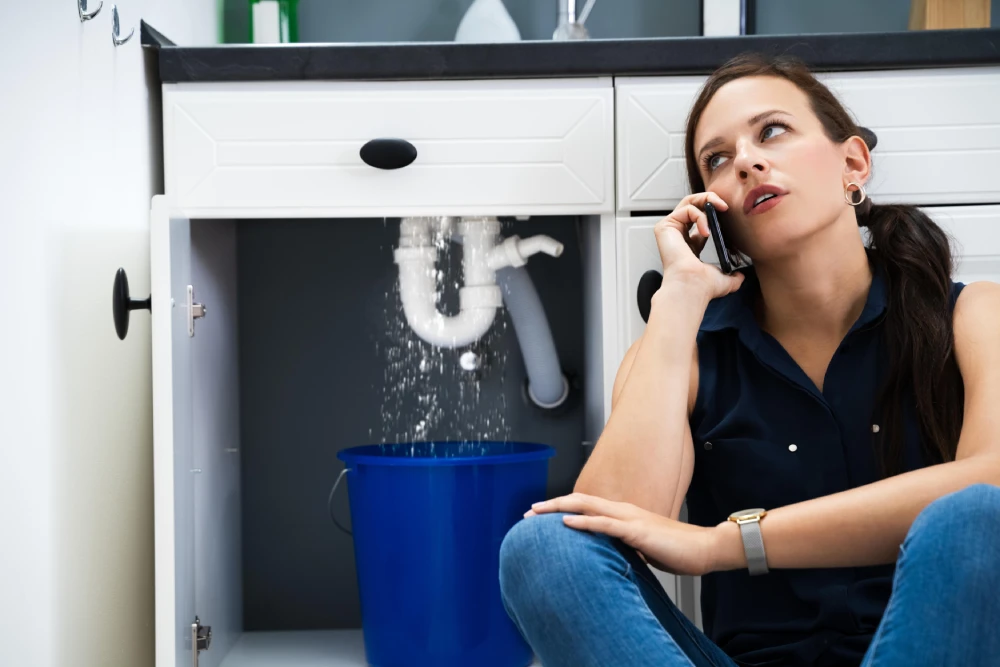Overview
A smelly drain is more than just unpleasant – it’s often a warning sign of a bigger plumbing issue. Whether it’s a kitchen sink smell caused by old food debris or a bathroom sink smell due to hair and soap scum, ignoring it can lead to costly problems.
In this article, we’ll break down the causes of smelly drains, explain how to eliminate drain smells using both natural and professional methods, and show you how to prevent drain odors from returning.
Why Is Drain Smell an Issue?
If you’re searching for how to get rid of drain smell, you’re not alone. Drain odors are a common household issue that affect even the cleanest of homes. That foul stench coming from your sink, shower, or tub isn’t just annoying, it can indicate anything from simple grease buildup in drains to more serious plumbing issues like sewer gas leaks.
The good news? You don’t always need harsh chemicals or expensive fixes. In many cases, the solution is simple, natural, and already in your pantry. Follow us because we are going to explain one of the most common causes for it and also how to prevent it.
Common Causes of Drain Smell
Let’s be honest, nothing kills the cozy vibe of your home like that mysterious, foul odor wafting up from the sink. You light a candle, spray some air freshener, maybe even blame the dog… but the stink persists. The truth? A smelly drain is your plumbing’s way of asking for help.
Before grabbing a bottle of drain cleaner and hoping for the best, it’s important to understand that these odors don’t appear out of thin air. They’re usually symptoms of something deeper, a sign that something inside your pipes is off balance. And unless you uncover the root cause, you’re likely to find yourself in a never-ending cycle of temporary fixes.
Below, we’ll dig into the four most common reasons your drains are acting up and more importantly, how to solve them for good.
Buildup of Organic Matter
If you’ve ever tossed food scraps down the kitchen sink or watched hair spiral into the bathroom drain, you’ve unknowingly fed the enemy: organic buildup. Over time, this gunk accumulates on the walls of your pipes – think grease, soap scum, hair, toothpaste, and tiny bits of food. Left unchecked, it begins to decompose and foster bacteria. The result? A pungent, musty odor that no scented candle can mask. It’s not just gross, it’s a sign that your drain needs attention. Built-up organic matter can restrict water flow, encourage clogs, and invite fruit flies and mold.
How to fix it:
- Start with a natural solution: Pour ½ cup of baking soda followed by ½ cup of white vinegar down the drain. Let it fizz for 20-30 minutes, then rinse with boiling water.
- For stubborn buildup, try a biological enzyme cleaner-it digests organic matter without harming your pipes.
- Establish a weekly routine: flush with hot water and avoid dumping grease or coffee grounds down the sink.
Regular cleaning keeps your pipes clear and prevents the stink before it starts. Prevention here is simple and pays off big time.
Sewer Gas Leaks
Nothing quite compares to the rotten-egg stench of sewer gas in your home. It’s not just unpleasant, it’s a red flag that something could be seriously wrong with your plumbing. Sewer gas leaks occur when your drainage system fails to contain and redirect the gases produced in your sewer lines.
Common causes include cracked pipes, corroded seals, or malfunctioning vents that allow gases to leak into your home rather than vent outside. Beyond the smell, sewer gases can be harmful to your health if inhaled in large quantities. And if left unaddressed, these leaks can escalate into larger (and more expensive) issues.
How to fix it:
- Inspect under-sink pipes and seals for cracks or corrosion.
- Check whether your vent pipe (usually exiting through the roof) is blocked by debris, leaves, or nests.
- If you suspect a leak but can’t find the source, a professional plumber can conduct a smoke test to pinpoint the exact location of the gas escape.
Acting early can save you from costly repairs-and give you back the fresh air you deserve.
Dry P-Traps
A dry P-trap is one of the most overlooked but common reasons for foul drain smells, especially in sinks or fixtures that aren’t used regularly. The P-trap is that curved pipe under your sink that holds a small amount of water. That water acts as a barrier, sealing off sewer gases and preventing them from traveling back into your home.
But here’s the catch: if the drain isn’t used for weeks (like in guest bathrooms, basements, or rarely used utility sinks), the water inside can evaporate, breaking the seal. No water = no barrier = bad smells.
How to fix it:
- Simply run water down unused drains every couple of weeks to keep the trap filled.
- For long-term dry areas, add a tablespoon of mineral or vegetable oil after running water-this slows evaporation.
- Consider installing a trap primer, which automatically refills the P-trap on a schedule (ideal for commercial spaces or frequently unused bathrooms).
It’s a small fix that makes a big difference. Keeping your traps wet is one of the easiest ways to prevent recurring odors.
Clogged Vents
Your plumbing system isn’t just about pipes and drains, it also includes a ventilation system designed to let air flow through the lines and release pressure. These vent pipes (usually leading through the roof) allow sewer gases to escape safely outside. But when vents get clogged – with leaves, debris, snow, or even bird nests the system backs up.
As pressure builds, it can force water out of your P-traps or slow down drainage altogether. Worse, it can push those nasty smells back into your kitchen or bathroom.
Warning signs of a clogged vent include:
- Gurgling sounds after flushing or draining
- Water draining unusually slow
- Multiple drains in the house smelling at the same time
How to fix it:
- Head to your roof and carefully inspect the vent pipe for blockages (if you’re comfortable doing so safely).
- Use a plumber’s snake or hose to gently clear debris.
- Not comfortable on the roof? A professional plumber can safely inspect and clear vents without risk.
Don’t underestimate venting, it’s the silent hero of your plumbing system. Keeping vents clear ensures pressure is balanced and sewer gases stay out of your living space.
Effective Methods to Eliminate Drain Smell
Once the root cause is identified, the next step is to apply targeted cleaning techniques. Below are several proven methods for removing drain odors effectively.
Regular Cleaning Practices
Consistent cleaning is the foundation of odor prevention. These simple practices help keep your drains clear and smelling fresh.
Before listing the techniques, here are the most commonly recommended cleaning practices:
- Use a baking soda and vinegar solution: Pour 1/2 cup of baking soda followed by 1 cup of white vinegar into the drain. Let it sit for 10-15 minutes before flushing it with hot water.
- Flush with boiling water: Weekly flushing helps clear grease and residue, especially in kitchen sinks.
- Clean the garbage disposal: Drop a handful of ice cubes down the disposal and run it to remove stuck debris and sharpen blades.
- Use enzyme-based cleaners monthly: These break down organic waste without damaging pipes.
By following a regular cleaning routine, you can greatly reduce the chance of odor-causing buildup and extend the lifespan of your drainage system.
Professional Plumbing Solutions
If standard cleaning doesn’t eliminate the smell, professional intervention may be required. This is particularly true for recurring or persistent odors. Here’s what professionals can do that home remedies often can’t:
- Perform a full system inspection: This includes checking for leaks, cracks, or venting problems using advanced tools like cameras or smoke machines.
- Clear deep clogs: Using hydro jetting or motorized drain snakes, professionals can eliminate clogs that are out of reach for homeowners.
- Fix structural issues: If sewer lines or seals are damaged, a licensed plumber can repair or replace them to restore proper function.
Hiring a plumber not only solves the immediate odor problem but also prevents future issues that could result in more serious (and expensive) damage.
Preventive Measures
Prevention is key to maintaining a clean and odor-free drain system. These best practices help keep your plumbing in optimal condition. To prevent future drain smells, consider adopting these habits:
- Flush rarely used drains regularly: This keeps P-traps full and functional.
- Use drain strainers: These catch hair and food particles before they enter your pipes.
- Avoid pouring grease or oils down the drain: These substances solidify and contribute to blockages.
- Clean kitchen sinks after meal prep: Wipe away food remnants to prevent them from entering the drain.
Staying proactive with these simple steps can save you from costly repairs and persistent unpleasant smells down the line.
When to Seek Professional Help ?
If you’re dealing with persistent drain odors or frequent clogs despite your best efforts, it might be time to call in a professional plumber. Professionals can quickly identify serious plumbing issues, like cracked sewer lines or blocked vents, which are often beyond DIY solutions.
Hiring a plumber guarantees that you benefit from expert tools and techniques, saving you time and preventing further damage to your plumbing system.
Final Thoughts
Getting rid of drain smells doesn’t have to be a guessing game. By understanding the causes, applying consistent cleaning practices, and knowing when to seek expert help, you can keep your home smelling fresh and clean.
If you’ve tried the DIY solutions but are still dealing with unpleasant odors, don’t wait for the problem to get worse. Book a consultation with First Chicago Plumbing today and let a certified professional restore your drains and your comfort.
FAQ
Why does my drain smell after rain?
Rain can increase pressure in the sewer system or temporarily block your plumbing vents, causing sewer gases to push back into your home. If the smell appears only during or after rain, it’s likely a ventilation or overflow issue.
Can mold inside drain pipes cause odor?
Yes, mold can grow in humid, low-flow sections of your drain where organic matter builds up. It releases a damp, musty smell that often worsens over time if not properly cleaned.
Does water softener discharge affect drain odor?
Discharge from water softeners can create an environment where bacteria thrive, especially in poorly ventilated or slow drains. This may lead to sulfur-like or rotten egg odors over time.




